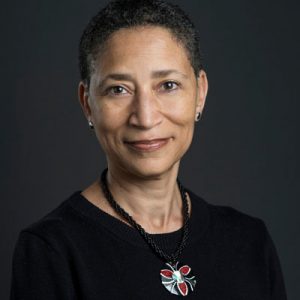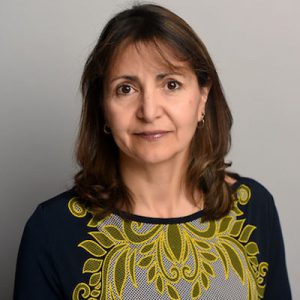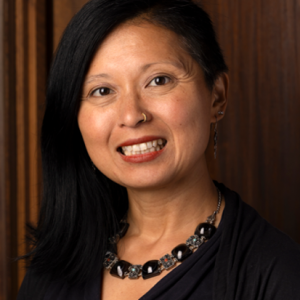SRJ Hub: Faculty and Researchers

Terry McGovern
Senior Associate Dean of Academic and Student Affairs
Terry McGovern, JD, is a human rights lawyer, advocate, and academic who is internationally recognized for her work in health and human rights, sexual and reproductive rights and health, gender justice, and environmental justice. McGovern previously served as the Harriet and Robert H. Heilbrunn Professor and chair of the Heilbrunn Department of Population and Family Health at the Columbia University Mailman School of Public Health. Prior to joining Columbia in 2002, McGovern served as senior program officer in the Gender, Rights, and Equality Unit of the Ford Foundation, where she oversaw global and domestic programming relating to HIV, gender, LGBT, and human rights.
In 1989, McGovern founded the HIV Law Project, where she served as executive director until 1999. While there, she successfully litigated numerous cases against federal, state, and local governments including S.P. v. Sullivan, which forced the Social Security Administration to expand HIV-related disability criteria so that women and low-income individuals can qualify for Medicaid and Social Security benefits; and T.N. v. FDA, which eliminated a 1977 FDA guideline banning women of childbearing potential from early phases of clinical trials.
McGovern’s research focuses on health and human rights, sexual and reproductive rights and health, gender justice and environmental justice, with publications appearing in journals including Lancet Child & Adolescent Health, Health and Human Rights, and the Journal of Adolescent Health.

Lynn Roberts
Associate Dean of Student Affairs and Alumni Relations
Assistant Professor of Community Health and Social Sciences
The City University of New York (CUNY) has been Dr. Lynn Roberts’ academic home since 1995. Prior to joining CUNY and the GSPHHP, she oversaw the development, implementation and evaluation of several prevention programs for women and youth in NYC. As an emeritus board member of the SisterSong Women of Color Reproductive Justice Collective, Dr. Roberts has been a national leader in the reproductive justice movement that has been advocating for the sexual and reproductive autonomy of women of color and other marginalized people for over 20 years. She is the co-editor and contributing author of Radical Reproductive Justice: Foundations, Theory, Practice Critique (Feminist Press, 2017). Dr. Roberts’ current activism and scholarship examine the intersections of race, class and gender in adolescent dating relationships, juvenile justice, and reproductive health policies, as well as the impact of models of collaborative inquiry and teaching on civic and political engagement. For decades Dr. Roberts has taught the Community Organizing to Advance Health and Social Justice course in our MPH program, with the highest student evaluation accolades.

Diana Romero
Professor in the Department of Community Health and Social Sciences
Director of the Maternal, Child, Reproductive and Sexual Health specialization
Dr. Diana Romero has engaged in research and evidence-based advocacy related to reproductive, maternal and child health over the past 20 years. From her early research on factors affecting contraceptive decision-making and continuation among women of different racial/ethnic backgrounds, to the differential impact of the COVID-19 pandemic on pregnant persons in NYS, she has focused on these experiences among marginalized groups by race/ethnicity, socioeconomic and related structural factors. Dr. Romero serves on the NYC DOHMH Advisory Board for the CDC Pregnancy Risk Assessment Monitoring System (PRAMS) survey, and she has served on the FDA Obstetrics and Gynecological Devices Advisory Panel, as well as on the Board of Directors of several non-profit research and advocacy organizations addressing reproduction, gender and health. She teaches graduate courses in research methods, community health, and reproductive and sexual health policy.

Clarisa Bencomo
Project Director for Gender Justice
Clarisa Bencomo works at the intersection of human rights, governance, and philanthropy, with an interest in how global, national, and hyper local systems and practices can be reimagined to promote greater equity. Before joining CUNY SPH, she was the Associate Director for Global Health Justice and Governance at Columbia’s Mailman School of Public Health and previously taught International Development in Columbia’s Graduate School of Architecture, Planning and Preservation. From 2010 through 2018 she developed and led governance programming for the Ford Foundation’s MENA Regional Office in Cairo. Her programming at Ford included support for participatory planning and budgeting to address spatial inequality; research and capacity-building to advance accountability for service provision; documentation and advocacy for policies that are inclusive of migrants and refugees; and regional learning networks and platforms around law and society, post-conflict recovery, and equitable urbanism. In addition to her work in philanthropy, she had a long career as a researcher and advocate on human rights and aid effectiveness, including more than a decade as a researcher at Human Rights Watch based in Cairo and New York.

Sabrina Das
Harkness Fellow
Sabrina Das, MB ChB, MRCOG, PGDip (BA), joins the SRJ Hub as a 2024–25 UK Harkness Fellow in Health Care Policy and Practice. Her fellowship project seeks to learn from innovations and harm reduction strategies used by formal, grass roots, and civil society efforts to support abortion access for minoritized people in New York. Das maintains a clinical practice as a Consultant Obstetrician and Gynaecologist at Imperial College Healthcare NHS Trust in London, specializing in high-risk pregnancy and complex intrapartum care. She also works for NHS England as a National Maternity Improvement Advisor in the Maternity Safety and Support Programme, the highest level of intervention for maternity units across England. She also works as an abortion surgeon for Marie Stopes International and has worked for Médecins Sans Frontières as a women’s health specialist in conflict zones.
Das is passionate about using quality improvement, coaching, and leadership skills in improving the lives of the largest global group of disenfranchised people (women and girls). Her life mission is to use her clinical and nonclinical expertise to narrow the gap in clinical outcomes and quality of life for women of color, women in poverty, and others who have suffered systemic and historical disadvantage. Das has led projects in Yemen utilizing quality improvement methods to reduce hemorrhage rates, in ethnically diverse West London to coproduce interventions to build trust between formal health care institutions and the local community, and in coastal communities of England to develop equitable pathways of care access. She has published and spoken extensively about quality improvement and how to take policy into practice.
In 2022, Das was listed as one of “50 Leading Lights” by the Kind Leadership Revolution’s Kindness in Leadership Campaign. That year she was also a finalist for the MAMA Academy Healthcare Professional of the Year Award, for providing personalized, culturally competent care to women with breech-presenting babies in pregnancy and labor. In 2021, she was a runner-up for the Health Services Journal Clinical Leader of the Year Award. In her spare time, Das volunteers for her local triathlon club and is an accredited British Triathlon Federation (BTF) Coach. She won the 2019 BTF Award for Children’s Coach of the Year.
